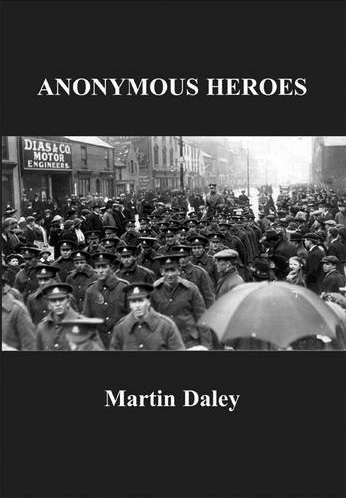Anonymous Heroes
Synopsis
In this story of the Great War…
…the challenge was to link local and family history to national and international history… By telling the story of his forefathers, Martin adds a human element and at the same time gives a snapshot of what life was like for working-class people in Carlisle. The period covered in this book was a time of great change.
Publisher: Hayloft
Published Date: December 2009
Format: Paperback
Category: History
Illustrations: B&W Photographs
ISBN : 978 190 452 4731
REVIEW
On June 28 1914 Jim Curran left his house in Caldewgate and walked to St Bede’s Church on Silloth Street for Sunday mass.
At the same time, thousands of miles away, Archduke Franz Ferdinand was visiting Sarajevo.
The assassination of the heir to the throne of the Austro-Hungarian Empire that day set in motion a chain of events that would lead to the declaration of the First World War – and shape the destiny of Carlisle men like Jim Curran and Willie Graham.
Great grandfathers of local author Martin Daley, their lives are explored in his new book Anonymous Heroes, which covers the Edwardian period up to and including the First World War.
“At first the event in Sarajevo seems unconnected to people like Jim and Willie but it altered history,” says Martin.
“The world was changed forever by that one incident. It was a catalyst, ultimately, to go to war. I find the way everything is linked fascinating.”
Martin, 45, says he didn’t want to concentrate solely on “the great and the good” like Lloyd George and Lord Kitchener, and was determined that characters like Jim and Willie should not be confined to the ‘No Man’s Land’ of history.
By doing so he gave himself quite a challenge: to link local and family history to national and international history.
But by telling the story of his forefathers, Martin adds a human element and at the same time gives a snapshot of what life was like for working-class people in Carlisle.
“They personify all of our ancestors who lived through tough times.
“And while it was very much a man’s world I was also interested in the women and their families.”
The period covered in Anonymous Heroes was a time of great change.
“Both men were Carlisle lads who lived in Caldewgate and Wapping, which was an area around Crown Street. They lived just round the corner from each other and both served with the Border Regiment.
“The period before the war, before it overtook everything, is poignant in its own way.
“Trade unions picked up and the Labour Party was formed. In 1906 there was a Liberal landslide and a period of reform.
“There was unrest and industrial action, with workers striking in Botchergate.”
Willie Graham was at the heart of protests in Wapping, as he and fellow carters picketed to demand better pay and conditions.
“You read about the Liberal reforms but until you’ve read or hear about real incidents affecting real people, it often doesn’t mean much.
“History is not a series of dates. It’s flesh and blood, it’s about people who lived and breathed and laughed and cried.”
With a tear in his eye Martin describes how, in 1913, when the women’s suffrage movement was at its height, a group of women from Carlisle, Wigton and West Cumberland met at the Market Cross and sang the national anthem prior to marching to the station and then onto London, where they joined 10,000 women campaigning for the right to vote.
“I just find that so moving,” he says.
Martin spent 12 months writing the book and about the same amount of time researching it.
He used archives at Carlisle Castle and the Public Records Office in London. Local newspapers of the time – stored at Carlisle Library – also proved invaluable.
Anonymous Heroes is Martin’s second book in a trilogy covering his family history.
The first, For Queen and Cumberland, published last year, tells the story of three ancestors from the 19th Century, including Isaac Scott, Martin’s great, great grandfather.
Isaac was born in rural poverty but he earned fame and honour through his exploits during the Crimean War and the Indian Mutiny.
His funeral in 1908 was one of the biggest Carlisle has ever seen.
Martin also wrote about him in another book, Glory Boy.
“I knew about Isaac Scott, we still own medals of his. Out of curiosity I got a raft of information about him and thought, what can I do with this?
“I’d been thinking about writing and fancied trying it. I had no pedigree but entered a national short story competition and the judges gave me such positive feedback it gave me confidence. I thought, there’s mileage in this.
“Then when I started writing about Isaac Scott it prompted me to look at my ancestors.
“You read about Queen Victoria and the Duke of Wellington but our own families are equally as fascinating.”
Martin’s pride in his ancestors is obvious. No doubt through his writing, they would be equally as proud of him.
Evening News and Star
Tuesday, 20 October 2009
